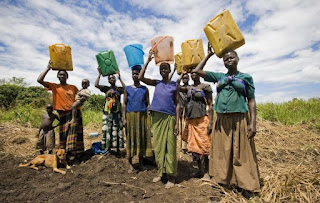A women's role: women and water collection
In this blog, I will discuss women's roles in water collection in Africa. First, it's essential to understand the prevalence of tradition in Africa, leading to a gender-based division of labour (Kameri-Mbote, 2008). In many African countries, customary laws support tradition, which "legitimises the subordination of women", creating gendered power imbalances (Makina & Moyo, 2016). This blog will build on this understanding of gender inequalities when looking at water collection.
Water collection is vital, with two-thirds of sub-Saharan Africa having to collect water outside their home, which is mainly a women's role (Graham et al., 2016). I will use the Makondo parish in Uganda to illustrate the burden of water collection. All 15 villages have no piped water, and most of the water collection is done by females (54% by women and 19% by girls) (Asaba et al., 2013).
 |
| Women in Uganda carrying water from a shallow well in plastic jerricans |
A time burden
Water collection creates a "time burden" which UNICEF and WHO estimate to be 16 million hours spent collecting water (Coles and Wallace 2005). In Asaba et al. (2013) study of the Makondo parish, 42% of journeys take 30minutes-1hour. This time could be spent more efficiently being productive, resting, or even managing water, which women can't participate in due to being busy (Koolwal and van de Walle, 2013). Graham et al. (2016) discuss how young girls do 62% of the collection compared to 38% being done by boys; this affects girls' education as they miss school and suffer from fatigue (Graham et al., 2016). Williams et al. (2022) state that 40% of young women are held back from schooling in rural Mali and Ethiopia due to walking long distances for water, impacting educational development.
A positive note … or not?
When I started this post, I wanted to take on board Wainiana’s (2006) article (refer back to first post) and not just talk about women being helpless or suffering. I hoped to find articles about women’s happiness, where they form community, socialise and become resilient while water collecting; however, research only displayed suffering, supporting Wainianas writing. Nevertheless, I did find that women are active agents of change, and their knowledge is vital, which I discuss below (Daoud, 2021).
Climate change
Researchers agree that vulnerability to climate change is highly gendered, as water scarcity will be enhanced with drought and flooding, meaning women will have to spend more time finding safe drinking water (Daoud, 2021). This is evident in Makondo parish, where long dry seasons result in 2-6 hours queues for water, cutting into girls' school day. Makina and Moyo (2016) discuss how lower female attendance in school will create negative-feedback mechanisms, such as less investment in girls' education, widening the inequality gap.
However, climate change has been a catalyst for empowering women in water management. My previous blogs have discussed how women have extensive knowledge of water from their role, making it essential to bring them to the forefront of conversation regarding climate change (Trisos et al., 2022). We can see increased empowerment of women in talks such as COP27 (refer back to the last post). Regardless, to effectively utilise women's knowledge, their voices must be heard within their communities. Evidence in Cameroon suggests that women’s knowledge is ignored (Makina & Moyo, 2016). Similarly, in Tanzania, women attend meetings but refrain from speaking up during them (Mandara et al.,2017). To be able to take advantage of women's knowledge, power relations and gendered inequality within communities must be overcome so that women can mitigate effects of climate change. Unfortunately, deeply ingrained traditions and laws mean women's empowerment will be challenging in Africa.
 |
| African women demand climate justice at COP27 |
Conclusion
Overall, it’s evident that women will be the most impacted and vulnerable to climate change. However, climate change could empower women through their vital knowledge of water. Nevertheless, ingrained gender inequality must be tackled for women to utilise their agency. Reflecting on my blog, it’s essential to mention that women in Africa are not homogeneous but have intersectional differences such as class, age and education, which create barriers and power struggles that are often not thought of (Trisos et al., 2022).

I really enjoyed the positive spin you put on this post. You're right, when talking about case studies of women in African countries it is often very negative. Women should not be belittled to damsels in distress waiting for men to come and improve the situation. They are capable of that themselves, they just need to use their voice. In what ways do you think climate change can empower women?
ReplyDeleteThank you for the comment! thank you for noticing the positive spin, think it is hard but crucial to see a different side to women in Africa and this is what this bluff hopes to do. I really think climate change can make people see the value of women knowledge, and with seeing how important they are to mitigation social norms and gender roles will begin to erode, and society / men will put women in a leadership position creating the empowerment of women. this is what I hope anyway although it seems pretty idealistic!
Delete